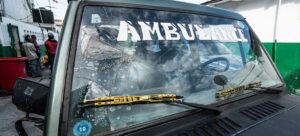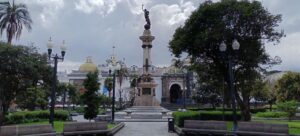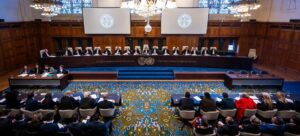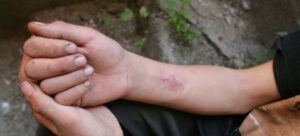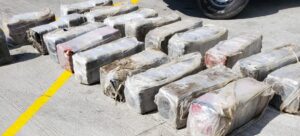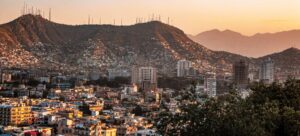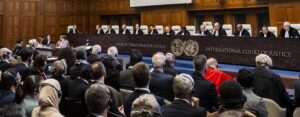Filed before the ongoing four-month-old war in Gaza began, the case has triggered heated commentary even before the court’s president, Judge Nawaf Salam, opened the hearings. This recap provides snapshots of the first days of hearings, from 19 to 21 February. The hearings will close on 26 February. Israel chose not to participate.
World court considers two specific questions
The General Assembly submitted two specific questions to the world court in its December 2022 request:
- “What are the legal consequences arising from the ongoing violation by Israel of the right of the Palestinian people to self-determination, from its prolonged occupation, settlement and annexation of the Palestinian territory occupied since 1967, including measures aimed at altering the demographic composition, character and status of the Holy City of Jerusalem, and from its adoption of related discriminatory legislation and measures?”
- “How do the policies and practices of Israel affect the legal status of the occupation, and what are the legal consequences that arise for all States and the United Nations from this status?”
Here is what unfolded in the beginning days of the public hearings at the Peace Palace in The Hague.
Foreign Minister Riyad al-Maliki of the Palestinian Authority delivers a presentation at the ICJ on 19 February 2024.
Palestine’s plea
Palestine presented its arguments for three hours on 19 February, with Foreign Minister Riyad al-Maliki beginning with these words:
“I stand before you as 2.3 million Palestinians in Gaza, half of them children, are besieged and bombed, killed and maimed, starved and displaced, as more than 3.5 million Palestinians in the West Bank, including East Jerusalem, are subjected to colonization of their territory and the racist violence that enables it, as 1.7 million Palestinians in Israel are treated as second class citizens and unwelcomed intruders on their ancestral land, as seven million Palestinian refugees continue to be denied their right to return to their land and home.”
Successive governments in Israel have left only three choices to Palestinians, he said, “displacement, subjugation or death. Here are the choices: ethnic cleansing, apartheid or genocide.”
Calling for “an end to Israel’s impunity”, which is “a moral, political and legal imperative”, he said “our people are here to stay…and they will not forsake their rights.”
Representing South Africa, Vusimuzi Madonsela, presents his country’s case against Israel at the International Court of Justice (ICJ) in January. (file)
South Africa describes practices as ‘apartheid’
Representing South Africa, which filed a separate complaint with the ICJ in December against Israel for “genocide in Gaza” – for which the court already issued provisional measures, Vusimuzi Madonsela, the country’s ambassador to the Netherlands, told the court on 20 February that after “decades of apartheid settler colonialism, a just solution for all who legally qualify to live in historical Palestine would need to be negotiated with the assistance of the international community”.
Drawing a parallel between the situation in Palestine and the struggle of South Africans against apartheid, an “institutionalized regime of discriminatory laws”, he said current practices ensure “Israeli-Jewish domination”. In this vein, he called for the “immediate, unconditional and total withdrawal of Israeli troops” from the occupied territories.
From ‘annexation’ to a ‘point of no return’
The Chilean representative said that Israel “neither regards itself nor behaves as a temporary occupant”, and its practices amount to “annexation”. He also recalled that Chile is home to the largest Palestinian community outside the Middle East and a large Jewish community, the third largest in Latin America.
Meanwhile, representing Algeria, law professor Ahmed Laraba estimated that Israel “aims at a point of no return” in the occupied territories to “discard all possibility of creating a Palestinian State”. He asked the ICJ to put an end to Israel’s “impunity” as an “oppressor” by reminding it of “a law which is not that of revenge, but justice”.
Saudi Arabia’s representative criticized Israel for “the dehumanization” of Palestinians, who are treated as “disposable objects” in Gaza. This situation demonstrates “how the illegality of the Israeli occupation for over more than five decades can degenerate into the ugliest of consequences”, the delegate said, also accusing Israel of “continuing to ignore the provisional measures ordered by the court” as part of the South African complaint on genocide.
Part of a barrier between Israel and the West Bank in Bethlehem. (file)
Arguing the right to self-defence
Speaking for the Netherlands, René J. M. Lefeber, legal advisor to the Foreign Affairs Ministry, recalled the foundations of the right to self-determination of peoples as well as the legal framework of the “use of force” and the right to self-defence in the event of an attack.
“The occupation of a territory can be legitimate within the framework of the right to self-defence in response to an armed attack” even if that does not come from a State, but from an armed group, he said, also highlighting the obligation to both respect international humanitarian law and put an end to its violations. He expressed hope that the ICJ could contribute to bringing peace to the Middle East.
Sharing borders with both Gazans and Israelis, Egypt challenged Israel’s use of the right to self-defence.
“The argument that a State may exercise self-defence against a territory under its own military occupation and effective control is counter-intuitive,” said Jasmine Moussa, legal advisor to Egypt’s Foreign Affairs Minister’s Office, adding that Israel committed a “war of aggression” in 1967 and then continued “decades of occupation” contrary to international law.
“Israel cannot invoke self-defence to maintain a situation created by its own illegal conduct,” she continued, underscoring the seriousness of the current situation, including in Rafah, where “Israel is continuing its policy of mass forcible expulsion of Palestinians civilians, all while the Security Council repeatedly fails to call for a ceasefire in callous disregard for Palestinian life”.
The Middle East region “yearns for peace and stability and a just, comprehensive and lasting resolution of the Palestinian-Israeli conflict based on the principles of international law and the establishment of a viable Palestinian State, on the pre-1967 lines, with East-Jerusalem as its capital”, she said.
Diego Colas, Director of Legal Affairs at the Ministry for Europe and Foreign Affairs of France, said Israel’s “right to defend itself” remains in accordance with international law.
Noting “the very heavy context in which these hearings take place” since the attack carried out by Hamas in Israel on 7 October, he defended “the right of Israel to defend itself and its population with the aim of preventing such attacks from happening again”.
However, this right must be exercised in strict compliance with international law, and in particular, international humanitarian law, he added, reiterating that while Israeli operations and bombings are creating thousands of civilian victims in Gaza, France has clearly, consistently and repeatedly affirmed this demand.
“Respect for international law, in particular international humanitarian law, by all stakeholders is the only possible horizon of peace,” he said.
As of early February, more than 80 per cent of Gaza’s 2.3 million population has been internally displaced since the start of the war in October 2023.
Calls for compensation, reparations
Turning to other concerns, France’s representative condemned Israel’s colonization policy, which has accelerated since 2004, as well as comments promoting the installation of colonies in Gaza and the transfer of the Gazan population “out of this territory”, which would constitute “a very serious violation” of international law.
As for reparations, he emphasized that “France considers that this obligation extends to all damage done to the Palestinian population” by proceeding with “restitutions and, failing that, compensation”.
Bolivia, which broke off its relations with Israel on 1 November 2023, denounced a situation of “apartheid” and “atrocities amounting to the crime of genocide” in Gaza. Its representative called for “Israel’s reversal of its illegal settlement policy” in the occupied territories alongside reparations and compensation.
When the hearings continued on 21 February, Colombia’s representative said Israel must cease all occupation and colonization and carry out reparations. “Israel has an obligation to compensate, in accordance with the applicable rules of international law, all legal persons having suffered any form of material or immaterial damage as a result of its occupation of the Palestinian territories.”
Qalandia checkpoint between East Jerusalem and Ramallah in the West Bank. (file)
A negotiated two-State solution
Brazil’s representative insisted on the need to move towards a negotiated two-State solution in “one of the most pressing unresolved conflicts on the international agenda since decades”, underlining that the importance of the question and the gravity of the situation were indisputable even before 7 October.
“The tragic events of that date and the disproportionate and indiscriminate military operations that followed, however, show clearly that the mere management of the conflict cannot be considered an option,” the delegate said. “The two-State solution, with an economically viable Palestinian State living side by side with Israel, is the only way to bring peace and security to the Israelis and the Palestinians.”
The United States is in favour of a political settlement within the framework established by the UN, said Richard C. Visek, legal advisor to the Department of State.
Recalling “the horror of the terrorist attacks of 7 October”, he acknowledged the context marked by “the ongoing conflict between Israel and Hamas, which has had severe, widespread and tragic consequences for Palestinian civilians in Gaza”.
He focused his presentation on the fact that stakeholders must return to the framework set by the Security Council and the UN General Assembly to resolve the conflict – a two-State solution – and highlighted the ICJ’s role in preserving this framework so as to make a negotiated solution a realistic possibility.
For its part, US efforts aim not only to address the current crisis, but “to get beyond where we have been, namely to advance a political settlement that will lead to a durable peace in the region that includes lasting security for Israeli and Palestinian and a path to Palestinian statehood”.
UNRWA Archives/Alaa Ghosheh
Palestinian farmers harvest olives with an Israeli settlement in the background. (file)
International law is not an ‘à la carte menu’
Cuba’s representative extended its criticism to the United States, asking the world court to consider Washington’s “complicity” in Israeli policies, including in the supply of weapons to Israel.
“International law cannot be an à la carte menu; it must apply equally to all,” said Lana Nusseibeh, Assistant Minister for Political Affairs of the Permanent Representation of the United Arab Emirates (UAE) to the UN.
End the occupation: Russia
“The occupation must come to an end,” said Vladimir Tarabrin, Russia’s ambassador to the Netherlands, advocating for a two-State negotiated solution and pointing to both the “persistent denial by Israel to the right of self-determination” and “the colonization policy pursued by Israel since 1967”.
He said more than 700,000 Israeli settlers live in the West Bank, including Jerusalem, and Israel’s settlement activities gained record-breaking speed in 2023, according to the latest report of the UN Secretary-General on the matter, which noted that plans for more than 24,700 housing units were advanced, approved or tendered – more than double the figure from the previous year.
“This has effectively undermined the prospects of a negotiated solution,” he said, adding that Russia hopes the ICJ can contribute to a solution to the conflict by stipulating that both parties “are under the obligation” to resume peace negotiations.
What is the UN world court?
The International Court of Justice (ICJ) is the principal judicial organ of the UN, established in 1945.
- The court’s role is to settle, in accordance with international law, legal disputes submitted to it by States and to give advisory opinions on legal questions referred to it by authorized UN organs and specialized agencies.
- The court is composed of 15 judges, elected for nine-year terms of office by the 193 Member States of the UN General Assembly and the 15-member Security Council.
- Read more about the UN world court in our explainer here.
